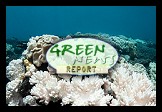


TWITTER: @GreenNewsReport
VIA SMART PHONE: Stitcher Radio!
IN TODAY'S RADIO REPORT: House GOP attacks America's clean energy industry --- again; Solar becoming cheaper than coal --- finally; Coal industry panicking --- naturally; Americans willing to pay more for clean energy, as long as it's not nuclear; PLUS: Australians are hot --- the hottest they've been in a thousand years ... All that and more in today's Green News Report!
Got comments, tips, love letters, hate mail? Drop us a line at GreenNews@BradBlog.com or right here at the comments link below. All GNRs are always archived at GreenNews.BradBlog.com.
IN 'GREEN NEWS EXTRA' (see links below): New GA nukes: $900m over-budget; Toxins in US breast milk?; US imposes tariffs on Chinese solar; New efficiency standards for major household appliances; Insecticide resistance threatens malaria fight; NRC pares back evacuations, disaster drills near nuclear plants; Rifts at UN climate talks in Bonn ... PLUS: 5 Things You Should Know About Clean Energy Investments ... and much, MUCH more! ...
STORIES DISCUSSED IN TODAY'S 'GREEN NEWS REPORT'...
- Limbaugh Mocks The Idea From "Wacko Nuts" That We Are Depleting Earth's Natural Resources (Media Matters)
- New Coal Industry Ad Lies About Obama's Record:
- Fox Is Now Literally An Ad For The Coal Industry (Media Matters):
The ad also mirrors Fox's recent attempt to blur the lines between potential technology that would capture and bury carbon dioxide emissions from coal plants (so-called "clean coal") and the same old coal that continues to emit more carbon dioxide than any other fuel, not to mention mercury and other toxic pollutants. The ad purports to show "Candidate Obama vs. President Obama on Clean Coal" but it really shows candidate Obama on "clean coal" vs. President Obama on dirty coal. - Big Coal’s new anti-Obama ad reeks of desperation (Daivd Roberts, Grist):
The U.S. coal industry is flailing. Utilities are stampeding from coal to natural gas and coal mining companies are seeing their stock prices plunge. The industry is responding the way it always has to threat: blaming government regulation and pouring money into influence peddling. - Why are U.S. taxpayers subsidizing coal mining? (David Roberts, Grist)
- CBO Report: Boosting Oil Production Won’t Protect Americans From Gasoline Price Shocks (Climate Progress)
- Solar-Powered Electricity Becoming Cheaper Than Coal-Powered Electricity:
- Solar Power Prices More Competitive Than Thought: BNEF (Bloomberg News):
Power from solar panels is much closer to price competitiveness with fossil fuel-generated electricity than many policy-makers and investors realize, according to Bloomberg New Energy Finance.Many decision-makers have yet to catch up with the improvements in the economics of solar power from recent reductions in the cost of the technology, a working paper released by the London-based research firm said today.
- Americans Willing to Pay More For Clean energy --- But Not Nuclear, Nat Gas:
- 76% of Americans Want Clean Energy Instead of Nuclear, Natural Gas, & Coal (CleanTechnica) [emphasis added]:
Yet another recent poll showed that Americans really support clean energy, across political affiliations (though, there’s clearly more support on the left).The ORC International survey, conducted for the nonprofit and nonpartisan Civil Society Institute (CSI), found that 76% of Americans (58% of Republicans, 83% of Independents, and 88% of Democrats) want to see ”a reduction in our reliance on nuclear power, natural gas and coal, and instead, launch a national initiative to boost renewable energy and energy efficiency.” (And who knows what the remaining 24% are smoking?)
...
Not only that, the public has clearly picked up on the fact that corrupt politics is a key reason we don’t have more of that. - Study: Public willing to pay for more green energy (The Hill's E2 Wire) [emphasis added]:
The survey found that the public is willing to tolerate electricity bill increases of up to $199 per year for a CES that includes renewable energy sources like wind and solar power. But the public has less tolerance when natural gas and nuclear power are added into the mix. - Despite Solyndra, support for government incentives still strong (Fierce Energy blog)
- CULTURE WARS: House GOP Attacks American Clean Energy - Again:
- GOP Tries to Create A New Solyndra-Like Loan Scandal (Forbes):
It was a new attempt by the GOP to create the kind of furor that occurred when solar manufacturer Solyndra collapsed last year...
...
Without the help of the loan, [Michael Ahearn, the chairman of First Solar] told the congressmen, “We wouldn’t be the biggest player in the U.S. utility market. We would be a much smaller player.” - Loan-Guarantee Winners Back Loans as Republicans Complain (Business Week) [emphasis added]:
John Woolard, chief executive officer of BrightSource Energy Inc., told lawmakers today that a $1.6 billion guarantee for a solar-generating facility in California will create 1,400 construction jobs at its peak. Without the backing, the company probably would have invested more overseas, he said. - Transcript: Statement of Gregory Kats, President of Capital E, Before the House Subcommittee on Regulatory Affairs, Stimulus Oversight, and Government Spending [PDF] (House Oversight Committee)
- VIDEO: The Obama Administration’s Green Energy Gamble: What Have All The Taxpayer Subsidies Achieved? (House Oversight Committee)
- Green energy CEOs to face loan questions (The Hill's E2 Wire)
- Republicans Order Navy to Quit Buying Biofuels (Wired Danger Room):
In its report on next year’s Pentagon budget, the House Armed Services Committee banned the Defense Department from making or buying an alternative fuel that costs more than a “traditional fossil fuel.” It’s a standard that may be almost impossible to meet, energy experts believe; there’s almost no way the tiny, experimental biofuel industry can hope to compete on price with the massive, century-old fossil fuels business.
..
But if the measure becomes law, it would make it all-but-inconceivable for the Pentagon to buy the renewable fuels. It would likely scuttle one of the top priorities of Navy Secretary Ray Mabus. And it might very well suffocate the gasping biofuel industry, which was looking to the Pentagon to help it survive. - Conservative thinktanks step up attacks against Obama's clean energy strategy (Guardian UK):
A confidential strategy memo seen by the Guardian advises using "subversion" to build a national movement of wind farm protesters. - Clean energy as culture war (David Roberts, Grist) [emphasis added]:
On clean energy, the material/financial aspects of the conflict are the easiest to understand. Wind, solar, and the rest threaten the financial dominance and political influence of dirty energy.
...
Witness:"Opposing Obama's energy policies was a natural fit for conservatives, said Marita Noon, a conservative activist from New Mexico who was at the meeting. "The American way, what made CostCo and Walmart a success, is to use more and pay less. That's the American way."
- More on clean energy and the culture war (David Roberts, Grist)
- House Republican accidentally tells truth about Solyndra investigation (Grist)
- After Failed Solyndra Investigation, GOP Leaders Want An Even More Absurd Investigation Of Clean Energy Grants (Climate Progress)
- Total Oil Offshore Gas Leak Finally Shut Down:
- Total stops North Sea gas leak (Reuters):
Total has succeeded in plugging a well from its North Sea Elgin platform that has been leaking gas for more than seven weeks, the French oil group said on Wednesday. - Australia & Asia: Hottest Period in 1,000 Years:
- Australasia has hottest 60 years in a millennium, scientists find (Guardian UK):
Study of tree rings, corals and ice cores finds unnatural spike in temperatures that lines up with manmade climate change - Australasia at its hottest in a 1,000 years - report (Stuff NZ):
"Our study revealed that recent warming in a 1,000-year context is highly unusual and cannot be explained by natural factors alone, suggesting a strong influence of human-caused climate change in the Australasian region," Joelle Gergis, the study's lead researcher, said. - More on Extreme Weather and the Greenhouse Effect (NYT Dot Earth)
- VIDEO: It's REALLY Gettin' Hot in Herre: (Peter Sinclair's Climate Denial Crock of the Week):
'GREEN NEWS EXTRA' (Stuff we didn't have time for in today's audio report)...
- $900m Over-budget: A Higher Price Tag for a Nuclear Project (NYT Green):
The flagship project of a hoped-for but not-yet-realized “nuclear renaissance,” the Vogtle 3 and 4 reactors under construction near Augusta, Ga., may cost about $900 million more than had been estimated, the Southern Company said in a filing this week with the Securities and Exchange Commission. - As Congress Continues Its Witch Hunt, Here Are Five Things You Should Know About Clean Energy Investments (Climate Progress):
1. The 1603 grant program supported up to 75,000 jobs and 23,000 renewable energy projects during the height of the recession. - Toxins In US Moms' Breast Milk (NPR's Fresh Air):
When writer Florence Williams was nursing her second child, she read a research study about toxins found in human breast milk. She decided to test her own breast milk and shipped a sample to a lab in Germany. What came back surprised her. Trace amounts of pesticides, dioxin and a jet fuel ingredient — as well as high to average levels of flame retardants — were all found in her breast milk. How could something like this happen? - US imposes tariffs on underpriced solar imports from Chinese companies (The Hill's E2 Wire):
Commerce preliminarily ordered U.S. Customs to impose tariffs of between 31 and 250 percent on various Chinese companies. - New Standards for Clothes Washers and Dishwashers Great News for Consumers (NRDC Switchboard):
The standards issued by DOE today will require clothes washers to use up to 35 percent less energy by 2018. - Extreme Weather: Extreme Rain Doubled In Midwest: Climate Study (Reuters):
The number of extreme rainstorms - deluges that dump 3 inches or more in a day - doubled in the U.S. Midwest over the last half-century, causing billions of dollars in flood damage in a trend climate advocates link to a rise in greenhouse gas emissions. - Insecticide resistance threatens malaria fight (Reuters):
Malaria-carrying mosquitoes in Africa and India are becoming resistant to insecticides, putting millions of lives at greater risk and threatening eradication efforts, health experts said on Tuesday. - U.S. asthma rates at all-time high, CDC says (LA Times)
- San Onofre's future hinges on finding cause of abnormal tube wear (LA Times):
The root of the problem at the nuclear plant is still a mystery. A key issue is whether Edison or ratepayers will have to cover the cost of replacement power. - NRC Pares Back Evacuations, Disasater Drills Near Nuclear Plants (AP):
Without fanfare, the nation's nuclear power regulators have overhauled community emergency planning for the first time in more than three decades, requiring fewer exercises for major accidents and recommending that fewer people be evacuated right away. - Bonn climate talks: EU plays down talk of Kyoto protocol rift (Guardian UK):
Under the terms of the Durban Platform agreed at last year's UN climate summit, the EU said it would sign on to an extension of the Kyoto protocol before it lapses at the end of this year in return for an agreement from all nations that a new binding treaty will be finalised by 2015 and enacted by 2020.
...
However, negotiators are divided over how long the extended Kyoto protocol should operate, with developing countries insisting the treaty should continue to be enforced over five-year commitment periods, and the EU expressing its preference for an eight-year commitment period that would allow it to be replaced by the new international treaty in 2020. - NASA Discovers Yet Another Terrifying Global Warming Feedback Loop (Treehugger) [emphasis added]:
Researchers have known for years that large amounts of methane are frozen in Arctic tundra soils and in marine sediments ... But now a multi-institutional study led by Eric Kort of NASA’s Jet Propulsion Laboratory has uncovered a surprising and potentially important new source of methane: the Arctic Ocean itself. - U.S. Coal Generation Drops 19 Percent In One Year, Leaving Coal With 36 Percent Share Of Electricity (Climate Progress):
According to new figures from the U.S. Energy Information Administration, coal made up 36 percent of U.S. electricity in the first quarter of 2012 — down from 44.6 percent in the first quarter of 2011. - Why power generators are terrified of solar (Crikey blog) [emphasis added]:
Here is a pair of graphs that demonstrate most vividly the merit order effect and the impact that solar is having on electricity prices in Germany; and why utilities there and elsewhere are desperate to try to rein in the growth of solar PV in Europe. It may also explain why Australian generators are fighting so hard against the extension of feed-in tariffs in this country.
..
Essentially, it means that solar PV is not just licking the cream off the profits of the fossil fuel generators — as happens in Australia with a more modest rollout of PV — it is in fact eating their entire cake. - Death on Earth: how the world's wildlife vanished (Independent UK):
The world's wildlife has declined by nearly a third over the past 40 years, a new estimate of the health of the planet suggests. - A Cloudy Day for Climate Skeptics: Mainstream Research Discredits Lindzen Theory of Low Climate Sensitivity (Climate Progress)
- Distorting science: Makers of flame retardants manipulate research findings to back their products, downplay health risks (Chicago Tribune):
Manufacturers of flame retardants would repeatedly point to this government study as key proof that these toxic chemicals — embedded in many common household items — prevented residential fires and saved lives. But the study's lead author, Vytenis Babrauskas, told the Tribune that industry officials have "grossly distorted" the findings of his research, which was not based on real-world conditions. The small amounts of flame retardants in typical home furnishings, he said, offer little to no fire protection."Industry has used this study in ways that are improper and untruthful," he said.
- Skeptical Science: Get the FULL DEBUNKING of ALL Climate Science Denier Arguments
- VIDEO: James Hansen: Why I must speak out about climate change (TED Talks):
Top climate scientist James Hansen tells the story of his involvement in the science of and debate over global climate change. In doing so he outlines the overwhelming evidence that change is happening and why that makes him deeply worried about the future. - VIDEO ANIMATION: Time history of atmospheric CO2 (NOAA Carbon Tracker YouTube channel):
- VIDEO: Animation Charts Modern Global Warming (NYT Green)
- Must-Read: Economist William Nordhaus Slams Global Warming Deniers, Explains Cost of Delay is $4 Trillion (Climate Progress):
Nordhaus's blunt piece - "Why the Global Warming Skeptics Are Wrong" - is worth reading because he is no climate hawk.
...
"The skeptics' summary is based on poor analysis and on an incorrect reading of the results." - Part 1: The brutal logic of climate change (David Roberts, Grist) [emphasis added]:
It's simple: If there is to be any hope of avoiding civilization-threatening climate disruption, the U.S. and other nations must act immediately and aggressively on an unprecedented scale. That means moving to emergency footing. War footing. "Hitler is on the march and our survival is at stake" footing. That simply won't be possible unless a critical mass of people are on board. It's not the kind of thing you can sneak in incrementally.It is unpleasant to talk like this. People don't want to hear it.
- Part 2: The brutal logic of climate change mitigation (David Roberts, Grist)
- How to Buy Time in the Fight against Climate Change: Mobilize to Stop Soot and Methane: A short list of relatively simple actions taken to reduce greenhouse gases other than CO2 could help put the brakes on global warming--if implemented globally (Scientific American)
- Climate Scientists Rebuke Rupert Murdoch: WSJ Denier Op-Ed Like 'Dentists Practicing Cardiology' (Think Progress Green)
- Saudi Oil Minister Calls Global Warming "Humanity's Most Pressing Concern" (Climate Progress):
"We know that pumping oil out of the ground does not create many jobs. It does not foster an entrepreneurial spirit, nor does it sharpen critical faculties."- VIDEO: Behold: The World's First 24/7 Solar Plant is Up and Running (Treehugger)
- World headed for irreversible climate change in five years, IEA warns: If fossil fuel infrastructure is not rapidly changed, the world will 'lose for ever' the chance to avoid dangerous climate change (Guardian UK) [emphasis added]:
The world is likely to build so many fossil-fuelled power stations, energy-guzzling factories and inefficient buildings in the next five years that it will become impossible to hold global warming to safe levels, and the last chance of combating dangerous climate change will be "lost for ever", according to the most thorough analysis yet of world energy infrastructure.
...
"The door is closing," Fatih Birol, chief economist at the International Energy Agency, said. "I am very worried - if we don't change direction now on how we use energy, we will end up beyond what scientists tell us is the minimum [for safety]. The door will be closed forever."- Concise Overview: The IPCC report on extreme climate and weather events (Real Climate)
- READ the IPCC Report: Managing the Risks of Extreme Events and Disasters to Advance Climate Change Adaptation (UN Intergovernmental Panel on Climate Change)
- The Real Global Warming Signal (Tamino)
- No, global warming hasn't stopped (New Scientist)
- Top UN Climate Official Blasts U.S. Climate Policy: Americans Must Realize "This Is Their Future They're Compromising" (Think Progress Green)
- VIDEO: Climate Scientists Michael Mann on "A Look Into Our Climate: Past To Present To Future" (TEDx, YouTube)
- Earth's Plant Growth Fell Because of Climate Change, Study Finds (NYT Green)
- Heads in the Sand: Warning: "Climate change is occurring … and poses significant risks to humans and the environment," reports the National Academy of Sciences. As climate-change science moves in one direction, Republicans in Congress are moving in another. Why?
(National Journal) [emphasis added]:Tim Phillips, president of Americans for Prosperity, says there's no question that the influence of his group and others like it has been instrumental in the rise of Republican candidates who question or deny climate science. "If you look at where the situation was three years ago and where it is today, there's been a dramatic turnaround. Most of these candidates have figured out that the science has become political," he said.
...
Groups like Americans for Prosperity have done it."


 Bad Climate News for Home, Car Owners; Good Labor News for Workers in the South: 'BradCast' 4/18/24
Bad Climate News for Home, Car Owners; Good Labor News for Workers in the South: 'BradCast' 4/18/24 'Green News Report' 4/18/24
'Green News Report' 4/18/24
 SCOTUS Suddenly Worried About Overcriminalization ... for J6 Insurrectionists: 'BradCast' 4/17/24
SCOTUS Suddenly Worried About Overcriminalization ... for J6 Insurrectionists: 'BradCast' 4/17/24 'Trump Media' Plummeting, MAGA Buyers Losing Life Savings: 'BradCast' 4/16/24
'Trump Media' Plummeting, MAGA Buyers Losing Life Savings: 'BradCast' 4/16/24 'Green News Report' 4/16/24
'Green News Report' 4/16/24 Trump's First Criminal Trial, for Cheating in 2016, Begins in NY: 'BradCast' 4/15/24
Trump's First Criminal Trial, for Cheating in 2016, Begins in NY: 'BradCast' 4/15/24 Sunday 'Party Like It's 1864' Toons
Sunday 'Party Like It's 1864' Toons Biden Closes 'Gun Show Loophole'; Repubs Turn Desperate: 'BradCast' 4/11/24
Biden Closes 'Gun Show Loophole'; Repubs Turn Desperate: 'BradCast' 4/11/24  'Green News Report' 4/11/24
'Green News Report' 4/11/24 'Pink Slime': Fake 'Local News' Sites Proliferating in Advance of Election: 'BradCast' 4/10/24
'Pink Slime': Fake 'Local News' Sites Proliferating in Advance of Election: 'BradCast' 4/10/24 Dirty Tricks and the Dirtiest Candidate Of All Time: 'BradCast' 4/9/24
Dirty Tricks and the Dirtiest Candidate Of All Time: 'BradCast' 4/9/24 'Green News Report' 4/9/24
'Green News Report' 4/9/24 'Titanic Law' Reform Just Tip of Iceberg in Quest for Key Bridge Accountability: 'BradCast' 4/8/24
'Titanic Law' Reform Just Tip of Iceberg in Quest for Key Bridge Accountability: 'BradCast' 4/8/24 Sunday 'Dark Days Indeed' Toons
Sunday 'Dark Days Indeed' Toons Trump's Very Bad Day in Court(s), Other Good (& Less Good) News: 'BradCast' 4/4
Trump's Very Bad Day in Court(s), Other Good (& Less Good) News: 'BradCast' 4/4 'Green News Report' 4/4/24
'Green News Report' 4/4/24 WI Supremes May Restore Drop-Box Voting
WI Supremes May Restore Drop-Box Voting WI Voters Approve Election Crippling Ballot Measures: 'BradCast' 4/3/24
WI Voters Approve Election Crippling Ballot Measures: 'BradCast' 4/3/24  Politico's Josh Gerstein Owes a Retraction
Politico's Josh Gerstein Owes a Retraction More GOP Election Fraud; Overdue Justice for Crystal Mason: 'BradCast' 4/2/24
More GOP Election Fraud; Overdue Justice for Crystal Mason: 'BradCast' 4/2/24 Last Week Today with OG Bloggers:
Last Week Today with OG Bloggers: It's Up to You, New York: 'BradCast' 3/21/24
It's Up to You, New York: 'BradCast' 3/21/24 'It All Comes Down to Brett and Amy': 'BradCast' 3/20/24
'It All Comes Down to Brett and Amy': 'BradCast' 3/20/24 American 'Bloodbath': 'BradCast' 3/19/24
American 'Bloodbath': 'BradCast' 3/19/24
 VA GOP VOTER REG FRAUDSTER OFF HOOK
VA GOP VOTER REG FRAUDSTER OFF HOOK Criminal GOP Voter Registration Fraud Probe Expanding in VA
Criminal GOP Voter Registration Fraud Probe Expanding in VA DOJ PROBE SOUGHT AFTER VA ARREST
DOJ PROBE SOUGHT AFTER VA ARREST Arrest in VA: GOP Voter Reg Scandal Widens
Arrest in VA: GOP Voter Reg Scandal Widens ALL TOGETHER: ROVE, SPROUL, KOCHS, RNC
ALL TOGETHER: ROVE, SPROUL, KOCHS, RNC LATimes: RNC's 'Fired' Sproul Working for Repubs in 'as Many as 30 States'
LATimes: RNC's 'Fired' Sproul Working for Repubs in 'as Many as 30 States' 'Fired' Sproul Group 'Cloned', Still Working for Republicans in At Least 10 States
'Fired' Sproul Group 'Cloned', Still Working for Republicans in At Least 10 States FINALLY: FOX ON GOP REG FRAUD SCANDAL
FINALLY: FOX ON GOP REG FRAUD SCANDAL COLORADO FOLLOWS FLORIDA WITH GOP CRIMINAL INVESTIGATION
COLORADO FOLLOWS FLORIDA WITH GOP CRIMINAL INVESTIGATION CRIMINAL PROBE LAUNCHED INTO GOP VOTER REGISTRATION FRAUD SCANDAL IN FL
CRIMINAL PROBE LAUNCHED INTO GOP VOTER REGISTRATION FRAUD SCANDAL IN FL Brad Breaks PA Photo ID & GOP Registration Fraud Scandal News on Hartmann TV
Brad Breaks PA Photo ID & GOP Registration Fraud Scandal News on Hartmann TV  CAUGHT ON TAPE: COORDINATED NATIONWIDE GOP VOTER REG SCAM
CAUGHT ON TAPE: COORDINATED NATIONWIDE GOP VOTER REG SCAM CRIMINAL ELECTION FRAUD COMPLAINT FILED AGAINST GOP 'FRAUD' FIRM
CRIMINAL ELECTION FRAUD COMPLAINT FILED AGAINST GOP 'FRAUD' FIRM RICK SCOTT GETS ROLLED IN GOP REGISTRATION FRAUD SCANDAL
RICK SCOTT GETS ROLLED IN GOP REGISTRATION FRAUD SCANDAL VIDEO: Brad Breaks GOP Reg Fraud Scandal on Hartmann TV
VIDEO: Brad Breaks GOP Reg Fraud Scandal on Hartmann TV RNC FIRES NATIONAL VOTER REGISTRATION FIRM FOR FRAUD
RNC FIRES NATIONAL VOTER REGISTRATION FIRM FOR FRAUD EXCLUSIVE: Intvw w/ FL Official Who First Discovered GOP Reg Fraud
EXCLUSIVE: Intvw w/ FL Official Who First Discovered GOP Reg Fraud GOP REGISTRATION FRAUD FOUND IN FL
GOP REGISTRATION FRAUD FOUND IN FL


































